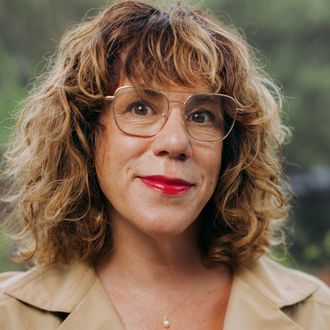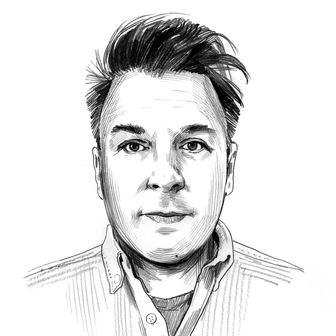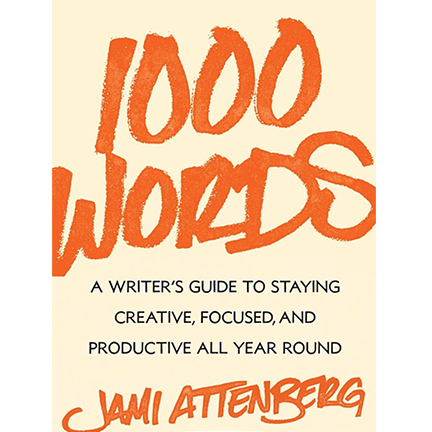
Every time I turn around, Jami Attenberg has published another novel or memoir. But I do not begrudge her this, because I know how she does it. For years, Jami has enlisted conspirators in writing a thousand words a day, come hell or high water.┬áToday, sheÔÇÖs out with another book (see what I mean?) about writing books, featuring advice from dozens of writers. The book is called┬á1000 Words.┬áSheÔÇÖs┬ádoing events with contributors in New Orleans, Brooklyn, D.C., and Philly this week and may be appearing near you soon. We chatted the other day before she left her home in New Orleans for the tour.
What I really liked about reading this book was ÔÇö well, my writing advice is like yours. You have to write a┬álot. Sure, be nice to yourself, but go. But then other people had other kinds of advice. J. Courtney SullivanÔÇÖs thing was so brilliant. She had a really young kid. She didnÔÇÖt have child care. And so every night she would send herself an email with the same subject line. And when she came back later, she called these emails her bread crumbs waiting for her to come and write them through. ThatÔÇÖs a brilliant technique.┬á
I could write this book because these people all told me I could.
You said recently youÔÇÖve been thinking a lot about aging, as one does at our age. Are you leaving yourself bread crumbs about aging?
I think so.┬áI started this other little newsletter about it. It has to do with aging as a woman, menopause, the culture. ItÔÇÖs very small, personal stuff, building a little community out of it. But itÔÇÖs not the big thing that I do ÔÇö well! I always say itÔÇÖs not the thing that I do and then itÔÇÖll always become something more. I think IÔÇÖm using this thinking for a character. If youÔÇÖve been writing professionally for a long time, nothing you do is a waste of time. Do you know what I mean?
Yeah!
ItÔÇÖs the same thing as the vibe of the book. ItÔÇÖs not a waste of time. People worry too much about that. Why donÔÇÖt you be playful? Why donÔÇÖt you enjoy what youÔÇÖre doing and not worry, not compare yourself to other people or say,┬áOh, IÔÇÖm not this. IÔÇÖm not that. Just sit down and try it.
All of our lives show that if you follow interests, they take you somewhere worthwhile. This book is really interesting about ÔÇö this is really ÔÇÖ90s ÔÇö but about declaring, ÔÇ£Well, IÔÇÖm an artist. IÔÇÖm living an artistÔÇÖs life. Where I live and how I live reflect these choices.ÔÇØ ItÔÇÖs refreshing to hear.
I was thinking about the very first time I met you, I think you had a party for bloggers? It was on the Lower East Side, and maybe it was even that bar that looked like an airplane. [Idlewild, on Houston Street, opened in 1998 and there is not a single picture of it online that I can find! The staff wore ÔÇ£stewardess outfitsÔÇØ!]
That is so funny. Co-hosted by writer and writing teacher Blaise Allysen Kearsley, I believe.
We didnÔÇÖt really know what blogging meant or if it would do anything for us or if it would take us anywhere. We were like, ÔÇ£This seems kind of interesting and cool.ÔÇØ It felt experimental. Your imagination never really steers you wrong. Your curiosity doesnÔÇÖt steer you wrong.
Had you published your first book yet?
No, I just had a blog. And I was making zines. I miss it. I really do. I like having things you can touch, because so much of what we do is ephemeral on the internet. I still have them. TheyÔÇÖre like precious little objects to me. And they donÔÇÖt take two years, too.
Books are so long, and thatÔÇÖs what stops so many of us, or traps so many of us.┬á
Now that IÔÇÖve crossed over the 50 threshold. IÔÇÖm really seeing,┬áOkay, this is the second half of my life. I figured out what I like to do, but thereÔÇÖs more to learn, more to try. I just want to keep doing as much cool stuff as I can for the rest of my time.
I was thinking about bad habits ÔÇö habits that have stayed too long at the fair. ThatÔÇÖs drinking, eating, smoking. When you quit smoking, were you afraid that you would never write again?┬á
Oh, I did love smoking. It was definitely how I took a break. If I write a couple hundred words, then I can have a cigarette. And it was part of going out. The conversation was better outside than it was inside. Or so we believed. I donÔÇÖt know if itÔÇÖs true, but it is fun to hang out with the smokers. IÔÇÖm okay without it.
A lot of the book is super-plain advice. Like, ÔÇ£Listen, youÔÇÖre going to do a messy draft.ÔÇØ And then in comes Patricia Lockwood whoÔÇÖs literally like, ÔÇ£Okay, so I needed a bag of magic rocks to tell me what to write every day.ÔÇØ Do you ever do anything esoteric or superstitious? Do you ask anything for help?
Every once in a while IÔÇÖll have Alex Chee read my tarot cards.
HeÔÇÖs a great tarot reader.┬á
ThatÔÇÖs what his bio should be. Legendary tarot reader Alexander Chee. But yeah, I spend time thinking about ghosts and visiting otherworldly places, catacombs and cemeteries. I live in a very haunted city. ItÔÇÖs a special environment thatÔÇÖs very creative, and thereÔÇÖs a lot of interesting old houses. This city is really inspiring to me. This city maybe helps me.
You write about the sounds in your house in the front and how that soundscape is different from the sounds in the back. The environment of the place is part of what youÔÇÖre making.
Everything I do is centered around being creative in one way or another. At this point I have to have my long walks and I have to read and I have to write in my journal. And I know a lot of people who are creative or interesting or open to creative conversations. ThatÔÇÖs really helpful. ItÔÇÖs having people you can surround yourself with. The book is so much about community, and I really believe in that. Finding your people is half the battle.
People have asked you since forever: How do I write a novel? Has your answer now changed, cemented? Now that you have a big answer in a book form, do you have a set answer that you give them? 
There are no shortcuts. The most important thing is that the┬ábest┬ápart of it is the writing. The best part of it is making something cool. We should really enjoy that process and not worry about the book deal or if youÔÇÖre going to get an agent or if you should build your social-media presence now. Which is a question that people ask: ÔÇ£How much should I be focusing on social media?ÔÇØ And IÔÇÖm like, ÔÇ£You should be focusing on getting 65,000 words down on the page.ÔÇØ And enjoying it. Why do you want to be here? What kind of writer do you want to be? What kind of stories do you want to tell? Those are the real questions you need to be asking. The answers are going to fill you up. The answers are going to help you grow as a person. Do I sound self-help-y?
No. YouÔÇÖre saying what I say to young writers, which is: ÔÇ£You probably donÔÇÖt write enough. YouÔÇÖre uncomfortable writing. If you wrote a thousand or 4,000 words a day, youÔÇÖre going to feel more secure. YouÔÇÖre going to be a better writer every day that you write.ÔÇØ But that also feels boring and unsatisfying. So people ask about your career.
The people I know who have done really cool stuff, itÔÇÖs like they just figured out what they were interested in. They just spent time trying different things and writing about different things. And I donÔÇÖt think youÔÇÖre supposed to do something you feel like youÔÇÖre supposed to. You make a career out of what you love to do.
Also, we should acknowledge that you canÔÇÖt move to New York City and spend $250 a month for a room in an East Village apartment anymore. So that path of becoming a writer has changed.
ItÔÇÖs really cool that people can live in other cities that are more affordable. There are people writing books all over the place. There are people making their art all over the place. You donÔÇÖt have to be in New York City anymore. The internet has changed all that. The way we communicate has changed all that. You can be anywhere and make your art. IÔÇÖm also not saying that you can make a living at it. In fact, the book is not about that at all. This book is not about getting a publishing deal but the satisfaction you get out of making your art.
People talk about adversity a lot in the book, which I really appreciate. Rebecca Carroll writes about how she works in the middle of her house while her son and her husband are watching TV. SheÔÇÖs saying, ÔÇ£If youÔÇÖre going to write, youÔÇÖre going to write. If youÔÇÖre not going to write, youÔÇÖre not going to write.ÔÇØ And Rumaan Alam says something really funny about how he was blown away when a friend told him ÔÇ£No one is going to ever ask you to write a book.ÔÇØ We should go to peopleÔÇÖs doors like JehovahÔÇÖs Witnesses, like Prince. We should ring peopleÔÇÖs doors and be like, ÔÇ£Hello, itÔÇÖs time for you to write a book.ÔÇØ
These letters of advice showed me how to write the book. My stuff is fine, but the book is really just a vessel for their advice.
I really loved hearing from parents about how they met those challenges. I had a lot of respect for how they did that.
They just work all the time, and theyÔÇÖre hungry for it, and they fight for it. I mean, I fight for it too, but theyÔÇÖve chosen this more complex path. I did┬áNPRÔÇÖs ÔÇ£1AÔÇØ show with Deesha Philyaw and Isaac Fitzgerald, and Deesha answered a question in a really interesting way. She had four kids and then she worked on┬áthat story collection┬áover a ten-year period. Somebody asked, ÔÇ£How do you manage your time when you have other obligations?ÔÇØ I always am afraid to answer that question. I literally donÔÇÖt have any obligations except I have to take my dog for a walk twice a day. I have the luxury of time. She said that you have to be willing to disappoint other people in order to be a writer. I thought that that was really fascinating. Sometimes you will make choices that other people might not be happy with ÔÇö but for sure you will be happy with yourself because you claimed your time to write.



